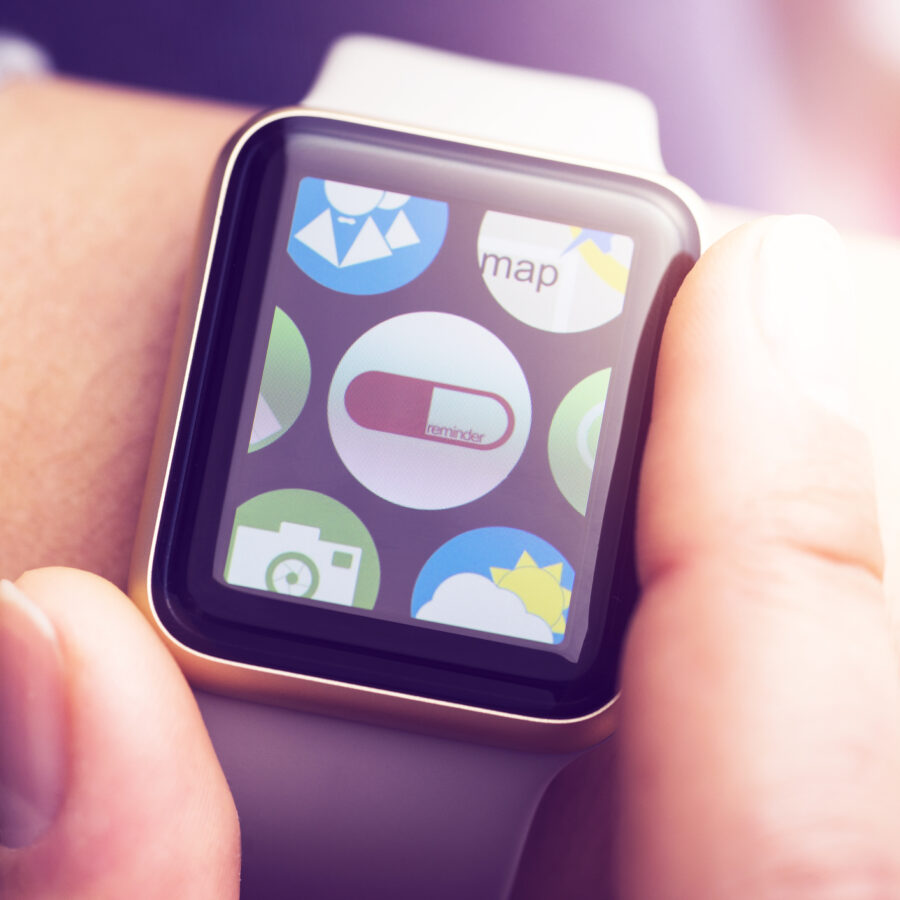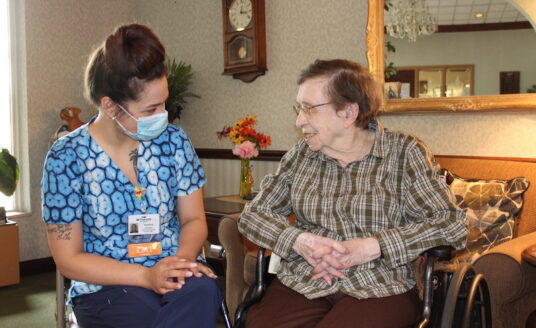As people age, managing medications becomes more complex, and the frequency of mistakes – with the potential of serious consequences – increases. 75% of older adults take one or more prescription medications, and 25% take five or more. Adverse drug reactions among seniors double when drug use increases from one to four drugs.
But thanks to technological advancements, seniors can choose from among many devices and apps to help manage their medications safely.
Devices for Managing Medications
Automatic pill dispensers are designed to make pills available at the right time, and prevent the wrong pills from being taken at the wrong time.
These devices feature some type of alert or alarm that reminds you it is time to take your medication. Additionally, they include a system that helps you convert multiple bottles of different pills into small groups of the pills you need to take at a specific time.
MedCenter Talking Alarm Clock. Up to four daily alarms can be set when medications are due with this device. The “Take Your Pills” talking alarm clock alerts users of the time and date, and which daily dose to take. The alarm sounds periodically until an acknowledgment button is pressed. The alarm features loud and extra-loud sound settings, and a large-type display that is backlit for night viewing.
Med-Q Electronic Medicine Box. This medication-dispensing device will light up the compartment holding the current dose or doses to be taken at the correct time. A loud alarm sounds repeatedly over a period of several minutes until the compartment is opened.
Hero Medication Dispenser: This device is a robot pill dispenser. The advantage of these devices is that they organize the pills into different groups, eliminating the need for the senior or caregiver to sort pills into different sections of a pill box.
However, loading the device may require a caregiver or family member to put the correct medications into the system and set up the dispensing schedule as prescribed via an app.
The good news – this product can accept up to 10 different types of pills and the number of dose schedules that can be created is limitless. It has the capabilities of sorting and dispensing up to a 90-day supply of medications.
The Hero dispenser flashes a light and sounds an alert when it is time to take a medication. A screen will ask the user to press a button (and then a confirming button) to dispense the medication(s). The dispenser also notifies the user when medication supplies are running low.
It also provides:
- Late or missed-dose notifications
- Detailed medication information
- Caregiver notifications
- Free software updates
- Daily adherence tracking
- Drug interaction monitoring
- 24/7 live support
Note: This option may not be suitable for seniors who are not tech-savvy or who have impaired cognition.
Medication Management Apps
Some seniors might prefer to set notices or alarms on their smartphones as a reminder to take and manage medications.
There are apps that make it easy for seniors and caretakers managing medications, allowing them to set up multiple dosing regimens for different prescriptions. In addition, these apps keep track of whether or not all the medications were taken as prescribed.
The app should also work consistently without ads, hard-to-read text, and hard-to-use interface design components.
All the following apps are highly recommended, free, and available for both iOS and Android devices:
MediSafe Medication and Pills reminder. MediSafe notifies the user when it is time to take a medication by making sounds that the senior can customize. The app also provides drug interaction warnings when prescribed medications should not be taken together. Users will receive notifications when it is time to refill a prescription. And seniors can list a caregiver as a Medfriend, who will receive notice if the senior has accidentally missed a medication.
In addition, users can receive medication coupons and discounts at many drugstores nationwide through GoodRx.
Dosecast. To use the Dosecast app, enter basic information about each medication prescribed, such as its name, dosage, and how and when it is to be taken.
Dosecast adjusts to a user’s changing day, enabling a person to take a dose early or postpone it as long as needed. It also tracks remaining quantities, sends refill reminders, and logs medication adherence, as well as tracking medication adherence that can be shared with a physician.
Dosecast is also available for Amazon devices.
MyMeds. This app enables the user to create, track, and share medication records with family, caregivers, physicians, and pharmacists. MyMeds will send the user reminders via text, email or mobile alarm when it is time to take a medication. The app connects the user to pharmacist Med Coaches and can set up medication lists for family members.
Visit Bethesda’s blog to find more articles covering senior health and technology.
| Bethesda has a 133-year tradition of providing excellent senior living options, including independent living, assisted living, memory care, and skilled nursing. If you are considering independent living, we welcome you to tour one of our exceptional communities, including Bethesda Barclay House – Clayton, Bethesda Gardens – Kirkwood, Bethesda Orchard – Webster Groves, Bethesda Terrace – South County, Village North Retirement Community – Florissant, and The Oaks at Bethesda Villas – Kirkwood/Webster. Discover the level of care only a non-profit staffed by highly-trained nurses, therapists, and aids can offer. |



